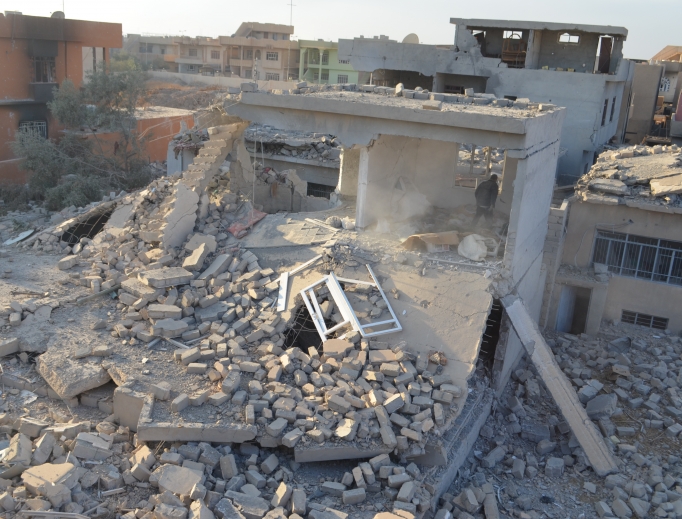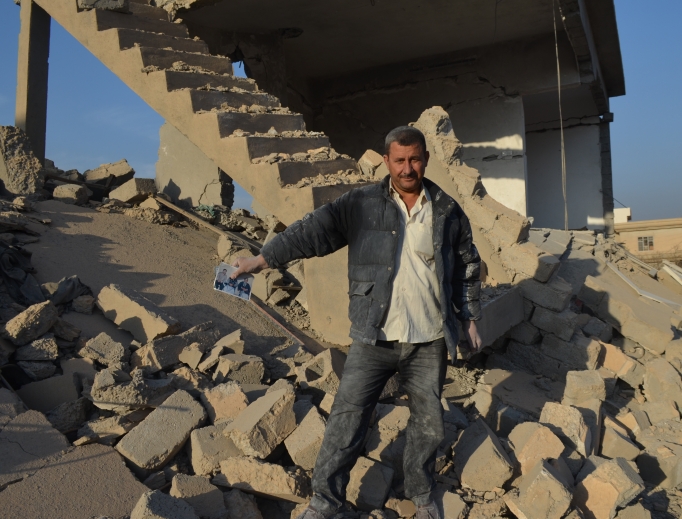Christians Ready for Christmas After the Caliphate’s Collapse
Christmas in Qaraqosh is not just a celebration of Christ’s birth, but an exercise in hope for Christianity in Iraq’s resurrection after ISIS.

QARAQOSH, Iraq — In their villages on the Nineveh Plain, Iraq’s Christians are celebrating their first Christmas since the region’s liberation from the Islamic State (ISIS).
In the little town of Qaraqosh (also known as Baghdida), there will be no flocks of sheep grazing, or cows lowing, as in years past, on the holy night of Christ’s birth — just the sound of Christians singing the Divine Liturgy at midnight in their burned churches.
More than three years ago, Yohanna Towaya left his home in Qaraqosh and escaped with his family as ISIS advanced. Coming back in September, he found his home had been torn apart and looted, with signs that ISIS had planned on burning it.
But Towaya, a Syriac Catholic, was relatively lucky: Many houses were destroyed, including those belonging to his parents and his brother.
“We left everything,” he said. “We [Christians] had millions of dollars, but left it to keep our faith.”
Christmas in Qaraqosh is not just a celebration of Christ’s birth, but an exercise in hope for Christianity in Iraq’s resurrection after ISIS.
More than 150,000 Christians were expelled from their homelands by ISIS’ genocidal campaign. Only 250,000 Christians are estimated to remain in Iraq. This December has seen one-third of the displaced Christian population return to their homes, according to figures kept by the Nineveh Reconstruction Committee.
Before the arrival of ISIS, Yohanna Towaya drew his income from three sources: his law practice, lecturing at the university and raising turkeys. All his agricultural equipment and poultry need to be replaced. But until he can get reimbursed, the funds Towaya needs to rebuild his business are tied up in the cost of the repairs to his house. Many other Christians are in similar situations.
Towaya said the Christians are reconstructing houses, but the pace is slow. The town has no potable water, and families are relying on generators to power their houses. The average cost to rebuild a destroyed home is $60,000. The minimum estimate for repairs to a damaged home runs about $5,000. It’s a tall order for the Christian survivors of the Islamic State’s campaign of genocide. Their savings were either left behind or spent during their displacement.
Father Salar Kajo, the vicar general for the Chaldean Catholic Diocese of Alqosh, told the Register that in Telleskuf, where he is a pastor, the Christians are getting “step-by-step” back to normal life. They reconsecrated and reopened their Chaldean Catholic church, St. George, which was badly damaged by ISIS, just in time for Christmas. The young people, he said, made a beautiful Nativity grotto and set up a large Christmas tree.
“We feel that this Christmas is a very special Christmas for us after three years of being displaced from our villages,” Father Kajo said.
The priest said Christmas is an opportunity for spiritual solidarity. But the big gift that Christians around the world could give them would be aid in “getting our villages rebuilt and supporting the peace in our lands.”
Rebirth in Christianity’s Cradle
Rebuilding the Christian community in Iraq requires outside help. Their Churches are the only working civic institutions in northern Iraq, and they have relied upon a variety of cooperating organizations, such as Aid to the Church in Need, the Knights of Columbus, the Catholic Near East Welfare Agency, and Catholic Relief Services, to name a few, to sustain their efforts.
Christian reconstruction, including homes, church properties, schools, hospitals and other public properties, has an estimated price tag of $250 million, according to Aid to the Church in Need.
Father Georges Jarhola, a Syriac Catholic member of the Nineveh Reconstruction Committee, told the Register the pace of reconstruction depends on the pace of financial support. The committee estimates it needs $60 million to rebuild or repair the 13,000 houses in the Nineveh Plains region damaged or destroyed by ISIS. Restoring these homes would pave the way for 90,000 displaced Christians living in Erbil to return. So far, Father Jarhola said, the committee has been able to spend just $1.2 million on homes.
Because livable housing is the top priority, the repair of most churches has had to wait. The people are celebrating this Christmas in burned churches, which have neither glass windows, electricity nor heat to ward off the below-zero temperatures in winter. But Father Jarhola said the plan is to get churches into top shape in time for Easter 2018.
For now, Father Jarhola said the Christians are witnessing to the hope of the Resurrection as they celebrate the birth of Christ.
“Celebrating Mass in a burned church sends a big message: that life goes up from death,” he said.
Challenges at Christmas
Northern Iraq’s infrastructure, long neglected before ISIS’ arrival, is unlikely to be repaired for a long time due to bureaucratic red tape.
Ashur Eskrya, the Dohuk-based director of the Assyrian Aid Society-Iraq, told the Register that the region needs a single political authority, not multiple political and religious authorities, coordinating the restoration of infrastructure and essential services. After returning to their homes, he said Christians are eager to get the electricity back on, clean water running and their churches restored.
“The Church for our people is one of the most important things for returning life to the people,” he said.
Assyrian Aid Society has been working with the U.S.-based Iraqi Christian Relief Council to rebuild homes and get some limited infrastructure working in Qaraqosh to make the town more livable.
The organization also has teams organizing Christmas activities in a number of villages to brighten people’s spirits. Some volunteers will dress up as “Papa Noel” to bring 3,000 gifts to children at Christmastime.
Eskyra said that the Christians on the Nineveh Plain need internationally guaranteed security to guarantee the region’s neutrality, make sure that Christians can return to their homes and properties, and assure people the genocide that took place under ISIS will never happen again.
If money from the U.S. Agency for International Development starts flowing to the churches, instead of only the United Nations, as Vice President Mike Pence announced in October, Eskyra said that would be a “concrete message” of support to Iraq’s Christians. Christian leaders in Iraq expect it will take some time for the U.S. to put the promised direct funding of their projects into place.
Security and Stability
Long-term success will depend on economic development. But first security is needed, in order for thousands of families to return from Lebanon, Turkey and Jordan.
“People are happy to go back to their villages, but security is a big issue,” said Michel Constantin, Catholic Near East Welfare Association’s (CNEWA) Beirut-based regional director. Some Christians have delayed their return to Mosul, Iraq’s second-largest city, because they fear former Islamic State militia are still prowling the city.
Constantin said the rebuilding and economic redevelopment is critical: Without the necessary money arriving soon to restore homes and livelihoods, the fear is that people will sell their property and leave — this time for good.
This Christmas, CNEWA has been funding a winter clothing drive to obtain hats, jackets and winter shoes for needy Christian children and their families. They are also working to restart the Christian hospital in Qaraqosh.
In Qaraqosh, Constantin said, a third of families had returned to the area, and the town had shrunk to approximately 10,000 people, a fifth of its former size. The agrarian economy that supported the region has to restart from scratch, because ISIS destroyed the livestock and equipment. All of that needs to be replaced.
In addition, he said, the fields have to be checked for unexploded shells and mines. All this runs into the millions of dollars.

Christmas Hope After ISIS
Christmas in Iraq usually is preceded by nine days of fasting, and then people fill the churches for midnight Mass. The liturgy is followed by people dancing in the streets, enjoying music and giving gifts to each other. In better days, the villages would launch fireworks into the night sky.
Towaya said the gift Christians in the Nineveh Plain want this Christmas is support and hope for the future.
Christmas celebrations continue for a second day, as people visit the tombs of the dead, reminding them of their ancient Christian heritage and their hope in the Resurrection.
Towaya said he and other Christians cannot abandon the bones of their ancestors. They have returned to bring their villages back to life and send a message to the world that they will stay in their lands and witness that Christianity will continue in Iraq.

“The people are building everything here for their faith,” he said. “Here, it is the earth of the apostles, the earth of Christianity.
“How can I leave it?”
Peter Jesserer Smith is a Register staff writer.
How You Can Help
Aid to the Church in Need
ChurchinNeed.org/help-iraqi-christians-return-home/
(800) 628-6333
Iraqi Christian Relief Council
IraqiChristianRelief.org/operation-return-nineveh/
(312) 912-4300
Catholic Relief Services
Support.CRS.org/donate/donate-syrian-refugees-and-iraqi-families
(877) 435-7277
Knights of Columbus (Christian Refugee Relief Fund)
KofC.org/en/secure/charities/hope.html
(800) 694-5713
Catholic Near East Welfare Association
CNEWA.org (Click on “Ways to Give” and select “Iraq” in the “Give by Location” section.)
(877) 284-3807

















